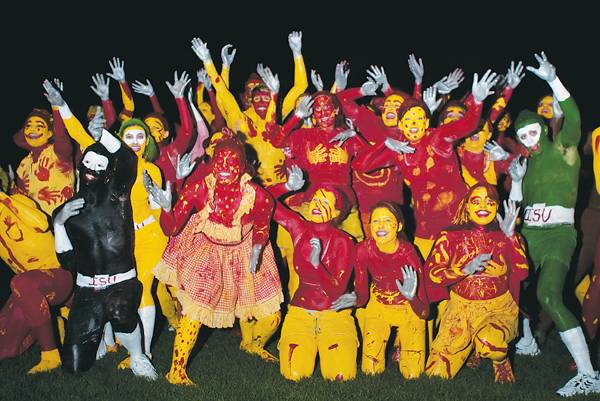Yell Like Hell tradition continues

Kappa Alpha Theta performs “Go, Go Cyclone Rangers” on Wednesday, Oct. 14, 2009 at “Yell Like Hell” on Central Campus. File photo: Gene Pavelko/Iowa State Daily
October 14, 2009
Every fall, greek students paint their bodies red and gold from head to toe to perform cheers and choreographed dance routines while shouting until their voices are hoarse. They scream the words of the ISU fight song, jump around wildly, waving their arms, and break into an intense “stomp.” The competition, known as Yell Like Hell, is a long-standing Homecoming tradition at Iowa State.
Yell Like Hell was first introduced to Iowa State in 1963. It was started with the goal of promoting school spirit and getting students involved. The first Yell Like Hell competition took place at the annual Homecoming barbecue. The rules stated that any group could submit a “yell” and would be judged on enthusiasm, appropriateness and originality.
Dan Paul, that year’s Homecoming co-chairperson, said in the Sept. 18, 1963 edition of the Iowa State Daily, “We hope this will become a tradition.” And it has.
Yell Like Hell is now a popular event for students during Homecoming. It consists of a five-minute skit, including three or four chants, the ISU fight song, complex choreography and cheerleading stunts. It has also gone through many changes over the past 46 years.
In the 1960s, Yell Like Hell was composed of a 10-minute skit, a poetry reading and possibly a cheer. The finals were held on the steps of Beardshear Hall, and audience participation was the main judging criteria.
By 1970, Iowa State’s greek community had become very involved in Yell Like Hell. Fraternities and sororities often teamed up to perform the skits together. The contest included a first round and finals, both of which were held in the Armory building. The Homecoming report for November 1972 described the plot of the winning Yell Like Hell skit, performed by Sigma Nu fraternity and Kappa Kappa Gamma sorority, as a class of ISU students in a section of English 104 who learn to spell “Cyclone,” then break into a jive to The Jackson 5’s “ABC.”
By the mid 1980s, a third round of eliminations was added. The practice of serenading between sororities and fraternities to determine the pairings for Yell Like Hell also began, a tradition that continues to this day. The competition was more organized, but not quite to the extent that it is today. Angie Dietz, a Yell Like Hell participant in the early 1980s, said the judging was more focused on how loud the groups were, with little attention given to the context of the skit or the choreography.
“I remember it was really loud chanting and cheering,” Dietz said. “We clapped so hard our hands burned.”
Within the past 10 to 15 years, the competition has become more complex. The judging criteria was changed to include a category for “display of school colors,” beginning the tradition of painting participants’ bodies cardinal and gold for the semi-final and final rounds of competition. A stomp became part of the skit, with intense clapping, thigh slapping and stomping combinations. Leigh Theidman, who was involved with Yell Like Hell in 2000, said new styles always seem to emerge.
“Some years, it seems like every group has taken it to a new level,” she said.
The original purpose of the skits has not been lost, as the competition has continued to be an opporunity for students to make friends, learn the fight song and display their school spirit.
“Looking back, [Yell Like Hell] introduced me to ISU tradition and gave me a lot of Cyclone pride,” said former Yell Like Hell participant Brandon Cutler.
Ashley Zappa, the 2006 Yell Like Hell coordinator, said the competition is a tradition that will “absolutely” remain strong at Iowa State for years to come. She said the students look forward to it every year.
Theidman agreed. “Nothing brings a community together like healthy competition, and that’s exactly what Yell Like Hell is.”






